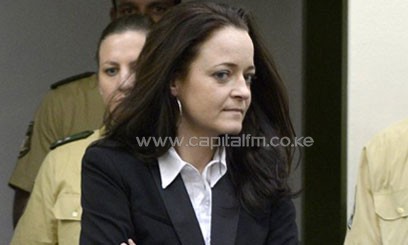The random discovery of the gang in late 2011 embarrassed authorities, exposing deep security flaws and raising uncomfortable questions about how the cell went undetected for 13 years in a country proud of owning up to its Nazi past.
Dozens of anti-racist protesters shouted slogans outside as Beate Zschaepe, 38, entered the heavily-guarded Munich courtroom, appearing relaxed with her arms folded.
She is charged with complicity in the murders of eight ethnic Turks, a Greek immigrant and a German policewoman between 2000 and 2007 as a founding member of the National Socialist Underground (NSU).
Dubbed the “Nazi moll” by media, she is also accused of involvement in 15 armed robberies, arson and attempted murder in two bomb attacks.
Her lawyers deny she was directly involved in murder.
Four men joined Zschaepe in the dock on charges of supporting the NSU.
Germans were stunned to learn in November 2011 that foreign criminal gangs were not behind the unsolved murders, as long suspected by police and the media, but home-grown racist killers.
The case only came to light after Zschaepe’s alleged accomplices, Uwe Mundlos and Uwe Boehnhardt, were found shot dead in an apparent murder-suicide.
Zschaepe then allegedly blew up their shared home in eastern Germany and later surrendered to police.
A DVD later emerged with a film in the style of a “Pink Panther” cartoon in which the group claimed responsibility for the attacks.
A probe into the handling of the case revealed oversights and missteps by police and domestic intelligence services and a realisation that the right-wing extremist threat had been grossly underestimated.
The head of domestic intelligence resigned in July after staff admitted shredding files relevant to the case, and a parliamentary committee has been set up to look into what went wrong.
The scandal also exposed a web of contacts between the secret services and the far-right in which the state systematically exchanged cash for information, raising questions about possible collusion.
Chancellor Angela Merkel has called the killings a “disgrace” for Germany and apologised at a February 2012 memorial for suspicion having fallen on some victims’ relatives, which she called “particularly tormenting”.
Interior Minister Hans-Peter Friedrich later pledged a root-and-branch reform of the security services to improve coordination and ensure accountability.
Dressed in a black trouser suit, white shirt and wearing large hoop earrings, Zschaepe entered the courtroom before the hearing got under way and stood with her back to the TV cameras.
Proceedings were adjourned for five minutes while the defendant talked to her lawyers after it emerged that Zschaepe has objected to chief judge Manfred Goetzl.
Her lawyers accuse him of bias in ordering the defence team to undergo security checks on entering the courtroom over the possibility of objects or messages being brought to defendants, while prosecutors, police and other parties are not required to be searched.
Reporters and members of the public queued up outside the court overnight to claim one of 50 free seats at what is Germany’s biggest terror trial since members of the prominent left-wing militant group, the Red Army Faction, were sentenced 36 years ago.
Outside hundreds of police were on guard as emotions ran high with two women scuffling with police as ethnic Turkish protesters held banners declaring: “How could they kill so many?”
Inside the court, many of the victims’ families got their first glimpse of the accused in person whose photo has regularly featured in the media but who has remained silent during her 18 months in custody.
She faces life in prison if convicted.
Lawyers for Semiya and Kerim Simsek, whose father was the first victim, said their clients who are co-plaintiffs would be seeking many answers.
“They want to know why their father was murdered. How they came upon the flower seller Enver Simsek? Did local neo-Nazi networks help in the victim selection?” they said in a statement.
A controversy over the accreditation of journalists overshadowed the run-up to the trial after the court initially failed to guarantee Turkish media seats when it handed out reserved spots on a first-come, first-served basis.
This strained German-Turkish ties and forced a last-minute postponement when Germany’s top court ordered it to allocate seats to foreign reporters, leading to the final 50 media organisations being chosen in a lottery.
Turkish media now have four seats but several leading German newspapers missed out.










































